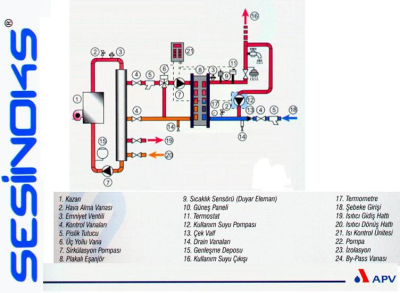One of the common usage areas of the plate heat exchanger is for heating domestic water. When choosing the heat exchanger to be used, it is very important that the capacity values and temperature values are determined in advance in order to make the right choice. Boiler operating conditions are generally accepted to be 90 -70°C.
The 10°C water coming from the network is required to be heated to approximately 60°C. If these values are not known exactly, some practical calculation methods have been developed to make an approximate choice. If the heat exchanger capacity is not given, the amount of hot water consumed by a family of four can be taken as 150 lt/h on average.

Heating Domestic Water Example:
If we determine the heat exchanger capacity to meet the hot water needs of a building of 10 flats;
m=10×150 lt/h = 1500 lt/h (Required hot water flow rate)
From the formula Q= m.c.(t2-t1),
=1500 . one . (60-10)
It is calculated as = 75 000 Kcal/h.
Heat Exchangers in heating domestic water
heating domestic water is a common need in many industrial and commercial applications, and plate heat exchangers offer an ideal solution for this task. Here are some reasons why plate heat exchangers are preferred for domestic water heating:
- High Heat Transfer Efficiency: The structure of plate heat exchangers allows them to have high heat transfer coefficients. This allows domestic water to be heated quickly and effectively, which saves energy.
- Compact Design: Plate heat exchangers offer high heat transfer efficiency and also have a compact design. This saves space and ease of installation, making it particularly ideal for use in confined spaces or mechanical rooms.
- Modular Expansion Possibility: As needs change or increase, plate heat exchangers can be easily expanded or reduced. This modular design allows businesses to adapt to changing demands.
- Easy Maintenance and Cleaning: Plate heat exchangers are often designed with easily accessible plates, making maintenance and cleaning easier. This helps maintain long-term performance.
- Compatible for Various Applications: Plate heat exchangers can be used in different temperature and pressure ranges. This provides a suitable option for a variety of domestic water heating applications.
Plate heat exchangers for heating domestic water are used in a wide range of areas, from large facilities such as hotels and hospitals to many areas commonly used in industrial processes and heating systems. The efficiency, durability and flexibility provided by these exchangers make them preferred in various industries.
 Stainless Steel Products
Stainless Steel Products Mixing
Mixing Pumps
Pumps Heat Exchangers
Heat Exchangers System Solutions
System Solutions